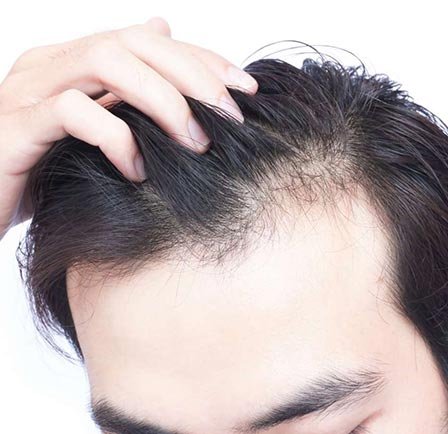Hair loss or Alopecia is a very common condition and affects one’s personality and confidence to a great extent. A proper diagnosis and appropriate therapy are of crucial importance to avoid progression of hair loss and restore a youthful appearance.
- Improper lifestyle, which includes unhealthy eating, stress and improper hair washing techniques
- Imbalance of thyroid
- Physical trauma such as an accident or surgery or chemical injuries such as acid burns
- Medical treatments such as chemotherapy or radiation
- Genetic disorders
- Infectious diseases such as herpes, leprosy and tuberculosis
- Skin diseases such as Lichen Planers and DLE

Androgenetic Alopecia –Commonly known as male pattern baldness, androgenetic alopecia is quite widespread. The balding will start in the form of thinning around the temples and the same will slowly progress towards the back of the head. Eventually, there will be a bald patch on the top of the head. The condition is often genetic and the hair follicles are often sensitive to dihydrotestosterone or DHT. The falling out of hair will be gradual and the chances of new hair growing will be minimal.
Alopecia Areata – This is an autoimmune condition, which can cause small patches where hair is missing or it could even lead to the complete loss of body hair.
Cicatricial or Scarring Alopecia – This is actually a serious condition, and also quite rare. The hair follicles are destroyed from within leaving behind scarred hairless patches.
Traction Alopecia – Pulled back hair might seem like a good hairstyle, but over a period of time, such hair styles will make the hair follicles weak. This in turn will make the hair more susceptible to breakage and if the habit continues, the hair loss might become permanent.
Telogen Effluvium– There is sudden increased shedding of hair in ‘telogen’ phase.
This can occur due to-
- Nutritional deficiency such as iron, zinc and protein in diet
- Autoimmune illness like thyroid disorder or diabetes
- Severe physical or mental stress, post pregnancy
- Acute illness like typhoid, dengue
- Intake of certain medicines can also cause this type of hair loss.
Some More Questions
It is crucial that a thorough physical examination be done and the history of the patient is looked into. Certain lab tests might be recommended, in order to gain a complete and comprehensive patient assessment. A biopsy and histology might be required to detect some rare types of alopecia.
Treatment will depend upon the cause of hair loss. Some of them are-
Non-surgical methods:
If the hair loss is not too extensive, nonsurgical methods are preferred. These include-
- Medicines like Minoxidil or Finasteride
- Mesotherapy
- Dermaroller with Hair Boosters
- Platelet rich plasma therapy (PRP).
Hair transplant
If there is complete or near complete hair loss, then hair transplant is ideal. There is the option of either follicular unit transplantation or extraction.
